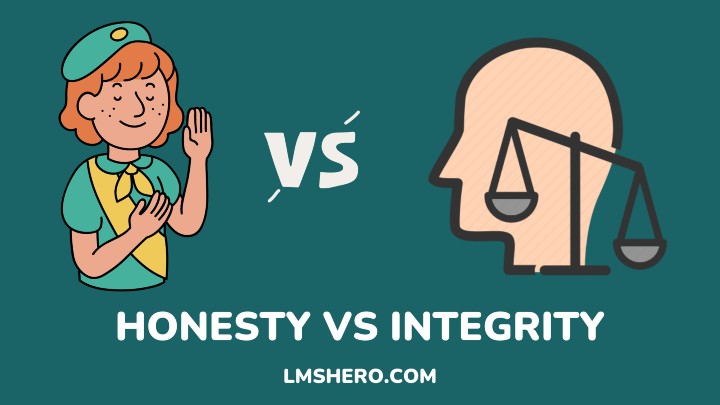Honesty and integrity are principles that are sometimes used interchangeably to describe truthfulness.
But, are both principles the same thing? While they share certain similarities, these principles have differences that set them apart.
This article explains the clear differences between integrity and honesty, their individual benefits, and why they are quite dissimilar.
What does it mean to be honest?
Honesty entails being dependable, obedient, impartial, and true. As a component of moral character, honesty implies the absence of dishonesty, deceit, theft, and other virtues while also implying virtues like integrity, truthfulness, and straightforwardness.
You consider a person to be honest if they always tell the truth and do not try to trick others or breach the law. It denotes being trustworthy.
What is integrity?
Integrity is the discipline of being truthful and demonstrating a steadfast and unwavering adherence to high moral and ethical standards.
You can also describe it as the quality, state, or application of morally upright, honest, and sincere behavior.
Integrity entails being trustworthy and upholding high moral standards. Even when no one is watching, someone with integrity acts morally and honorably.
What is the difference between honesty and integrity?
Consistent conduct, be it honest or not, is the definition of integrity while being truthful about a topic at hand, even if you are wrong, is the definition of honesty.

Truthfulness to others and being true to yourself are the two characteristics of honesty. However, a person with integrity upholds strong, morally upright values including honesty, and adheres fervently to them.
Being honest entails not making false pretenses about who you are. Integrity is defending what you think is correct and upholding your core principles.
Which principle is better between honesty and integrity?
When you consider what both principles entail, integrity is better than honesty. One key difference between honesty and integrity is that while one cannot behave with integrity without being honest, you can be honest without having integrity.
Depending on your perspective or principles, integrity may or may not entail taking action; honesty, on the other hand, just necessitates that you avoid lying.
What are the benefits of honesty?
Honest people tend to have faith in themselves. As an honest person, you never undervalue the capacity to trust yourself and that can impact your life positively.
- Friends of higher quality. Sincerity draws other honesty. Honest and reliable individuals attract like-minded individuals. And it is best to have buddies like that.
- Less stress. Maintaining dishonesty is stressful. Even for the most seasoned actors, pretending to be something you’re not, calls for continual attention to detail. With honesty since you are simply being yourself, you are able to relax and feel less stressed about keeping certain appearances.
- Developing better friendships. Greater intimacy can only be attained through honesty and integrity. Your close pals prefer the “real you” over the person you’ve fabricated.
What is the benefit of integrity?
- Our brain has developed to facilitate links and connections on a social level and be social. A person of integrity also helps to create a space where people can connect safely.
- Integrity enables young people to make wise decisions about their life by teaching them to accept responsibility for the results of their actions.
- Social action is motivated by integrity. Hence, integrity is essential for maintaining healthy communities free from corruption and hypocrisy as well as social harmony.
- Integrity is associated with contentment, a high feeling of your own worth, confidence, and self-assurance.
- People with integrity are seen as being honest, fair, and dependable and also have more relationships that are of a high caliber.
Importance of integrity in the workplace
Having integrity makes you a dependable, loyal and honest employee.
Although integrity can take many different forms, dependability, honesty, commitment, and sound judgment are the qualities that employers most value.
Having integrity in the workplace as a person entails:
- Honesty, reliability, and trustworthiness are your virtues
- There is a consistency between your words and your actions
- These values are reflected in your behaviors and performance
- Your communication is honest and open
- You also readily admit mistakes, make corrections, and show dedication and care to your work
FAQs
Why is honesty called the best policy?
This is because kindness, discipline, truthfulness, moral integrity, and other positive traits can all be developed with honesty.
Can integrity exist without honesty?
No, integrity cannot exist without you being honest.
Sincerity or truthfulness are the terms used to describe honesty, while integrity has a far broader definition that includes both honesty and moral uprightness.
Can integrity be learned?
Yes, integrity can be learned and developed.
People don’t generally have an innate sense of integrity. It is acquired through social interactions with peers and the role models provided by teachers, families, and other community leaders.
Conclusion
While a lot of people can be honest, not everyone who is honest necessarily possesses integrity. This means that while you may be truthful in your dealings, you may be lacking in your adherence to high moral and ethical standards.
For example, you can be honest and still commit immoral acts or vices like prostitution, dealing with narcotics, gambling, etc. However, someone with integrity will uphold high moral standards and avoid immorality.
I hope you found this article helpful. You can also read about high moral standards and what it means to have high moral values.
Thanks for reading.







